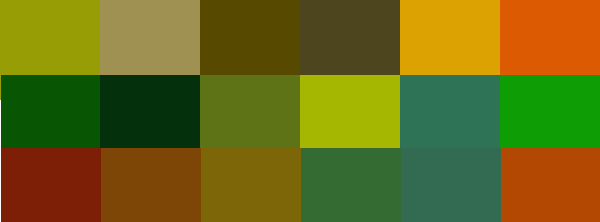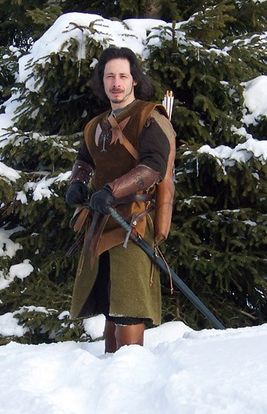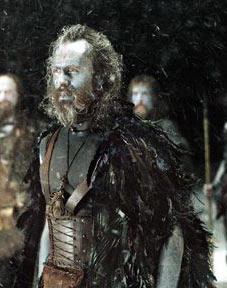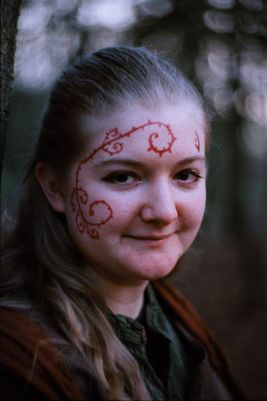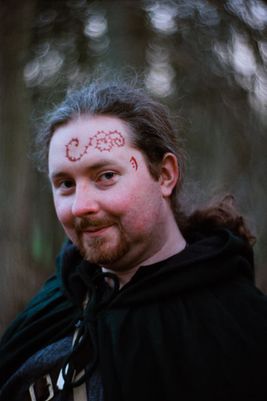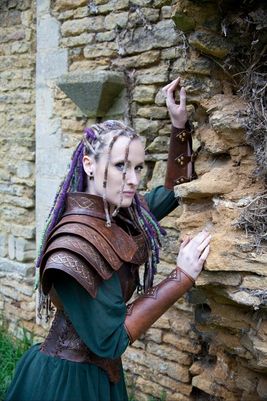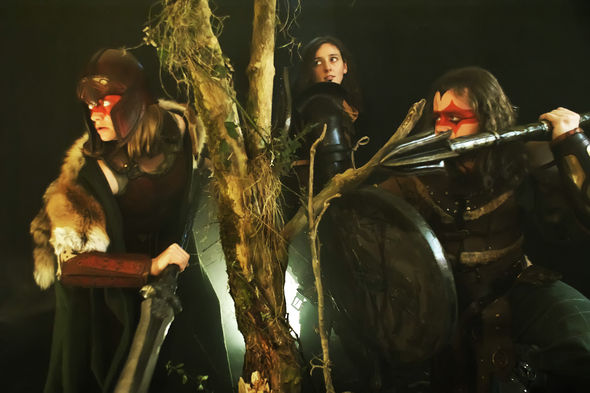Navarr look and feel
(→Hair: moving hair out of clothes) |
|||
| Line 77: | Line 77: | ||
<span4>{{CaptionedImage|file=NavarrTattoo4.jpg|width=267}}</span4> | <span4>{{CaptionedImage|file=NavarrTattoo4.jpg|width=267}}</span4> | ||
<span4>{{CaptionedImage|file=NavarrTattoo2.jpg|width=267}}</span4> | <span4>{{CaptionedImage|file=NavarrTattoo2.jpg|width=267}}</span4> | ||
</row-fluid> | |||
===Hair=== | |||
Braids and dreadlocks are common, as are beads and other decorations woven into the hair. | |||
<row-fluid> | |||
<span4>{{CaptionedImage|file=NavarrHair1.jpg|width=267}}</span4> | |||
<span4>{{CaptionedImage|file=NavarrHair2.jpg|width=267}}</span4> | |||
</row-fluid> | </row-fluid> | ||
Revision as of 16:03, 4 March 2015
Overview
The Navarr look draws heavily on the forests for its inspiration. The colours are primarily greens and browns with occasional splashes of dark autumnal red or yellow. Materials are practical, primarily those that come from hunting - leather and fur. Facepaint, tattoos and brands are common, especially on the face and around the eyes. Navarr mark oaths and other important commitments with brands, tattoos or scars. Most warriors only apply war paint before they go into battle, but some Navarr choose to wear it every day, a symbol of their constant readiness.
Rather than rich materials or unusual colours the Navarr personalize their appearance by adorning their costume with beads, feathers, fetishes, and other accessories. It is common to weave such items into the hair.
Also see Navarr Costumes and Navarr Icons and Artistry.
Feel
Wild, unsettling, otherworldly, alert, pragmatic, tattooed, fierce, primal, blood
Colours
The palette is the colours of spring: soft greens and browns, gentle misty greys, and perhaps the dark red of blood.
Materials
Primarily leather and fur, with some layers of cotton, linen or wool. Fine fabrics such as velvet or silk are rare.
Clothing
Navarr clothing is layered, serviceable and well-worn, The Navarr are a practical people and their clothes reflect this. Even for civilians, it often features pieces of leather armour, though this is to protect against the environment as much as enemy weapons. Clothes are suitable for people who live their lives in the wild forests. Not just a robust construction but practical designs, for instance hooded cloaks that give protection against the weather, but can also serve as bedding. Layered clothes are common, so that outfits be easily changed no matter the weather. Belts and straps feature quite heavily – both to secure clothing so it doesn’t snag, and to hold a variety of gear securely while moving through woodland. Patched and mended fabrics are frequent, as worn and ripped clothes are mended 'on the go'.
Navarr style of dress varies, depending on how much contact the striding or steading has with the other nations. More isolated Navarr may adopt a rougher, more practical or primitive look, primarily comprised of leather, furs and natural materials, suitable for hunters who are used to sleeping rough. Those Navarr who trade with their neighbours are more likely to have access to wool and similar materials so their costume reflects their closer contact with fellow members of the Empire. However, most Navarr will fall somewhere in between these two extremes.
For more formal functions many Navarr wear highly decorated leathers and their most impressive furs, but more importantly wear their most intricate paints and markings.
Shoes
Navarr shoes can take many forms, as long as they are practical. For this reason close fitting leather boots are most common, often coming to or even past the knee, to protect the lower legs while walking. Ankle boots in soft suede and canvas are also seen, often with the addition of puttees and wraps in cloth and leather.
Those Navarr who trade with their neighbours are more likely to have access to wool and similar materials so their costume reflects their closer contact with fellow members of the Empire, often those groups they have the most contact with. However these will usually be given a Navarri slant though, with fur trims, decoration in natural materials and a natural colour palette.
More isolated Navarr adopt a look primarily comprised of leather, furs and natural materials, suitable for hunters who are used to sleeping rough.
Children
Navarr children are taught the value of being prepared and ready at all times. They are encouraged to learn to fight with sword, spear and bow from an early age. Their clothing tends to be simplified versions of adult clothing - garments that are practical for play but also easy to keep clean. Older children are often given adult clothing and then belted, tied and strapped to fit.
Icons and Artistry
Jewelry and Decoration
Navarr favour jewelry that represents the twisting journeys of the Great Dance. Knotted metalwork in either base or precious metals; rings, bracelets, armbands, torcs and brooches are the most common types found. When it comes to decoration, natural materials are drawn from heavily. Feathers and fur may trim clothes, and beads made from seeds, wood and stones will adorn many of their garments. Patterns may also be painted onto clothes, again using natural colours like ochre, red, black and white.
Tattoos
Tattoos are common amongst the Navarr, used to memorialize significant moments in the Navarr’s life. They mark sworn oaths with tattoos, brands and scars, as a visible sign of the commitment they have made. Most tattoos are done with a dark red ink, symbolic of the blood that flows beneath the skin. It is not unknown for Thorns and Brands to permanently tattoo their warpaint. Thorn motifs are the most common design. Other common motifs are include blood, twisting plants, star-shaped flowers and feathers.
They use less permanent warpaint on their face or hair when preparing for conflict. It can be meticulously applied in intricate entwined patterns or simply daubed with a finger. Donning the paint helps them prepare themselves and commits them to their course. Many Navarr warriors wear warpaint every day as a sign of their readiness to fight.
Hair
Braids and dreadlocks are common, as are beads and other decorations woven into the hair.
Banners and Symbols
The banner of the Navarr is a great white tree surrounded by a knotted circle of thorny-branches. Most large Steadings and Stridings also have their own banner using similar stark images for their design.
Decorating their tents at Anvil
Arms and Armour
Armour
Thick hardened leather is the most common form of armour for the Navarr, occasionally supplemented with light chain or scale. Navarr armour often features an asymmetric pattern, with lines and closures that run diagonally across the body rather than vertically.
Shields
Shields are narrow and fluted, barely wider than the wielder. They are often heavily decorated with the thorn motif.
Weapons
The iconic Navarr weapon is a spear, often with a barbed shaft and decorated with thorn motifs. This echoes the spear of their legendary hero, Navarr. Otherwise weapons are, light, practical and good for skirmishing rather than heavy combat.
Bows are another favoured Navarr weapon. Like the spear they are an effective tool for hunting as well as a weapon of war.
Mage Implements
Less Appropriate
Celts and Native Americans
As Navarr are not based on Native Americans, large quantities of turquoise beading, and leather tassels are best avoided. Similarly, Celtic style knot-work isn't suitable as decorative patterns.
Similar nations
Wintermark
Navarr tend to wear light leather armour and simple, earth tone clothes, much like the Steinr. Navarr decorations are more likely to come from nature, in the form of paints, feathers and beads, rather than the woven trims popular with the Steinr.
Kallavesi mystics may also be occasionally mistaken for Navarr Vates; however, the Navarr do not wear animal headresses and do not believe in evoking animal spirits.
The Marches
There are also overlaps between the Marches beaters and the Navarr. The beaters tend towards later medieval period clothing, like jacks rather than the tunics and vests popular with the Navarr. The Navarr also tend to use large amounts of furs, pieces of leather and paints that the Marchers would avoid.
Influences
Wood elves, The Rangers from Lord of the Rings.
